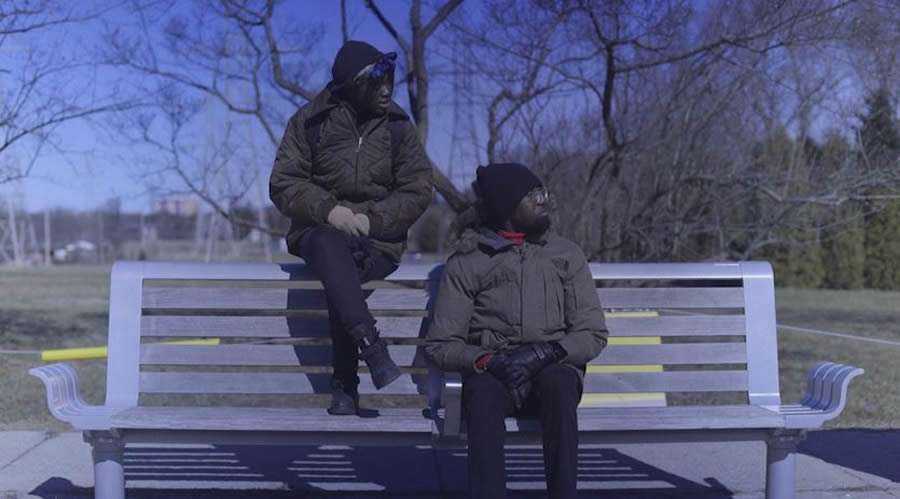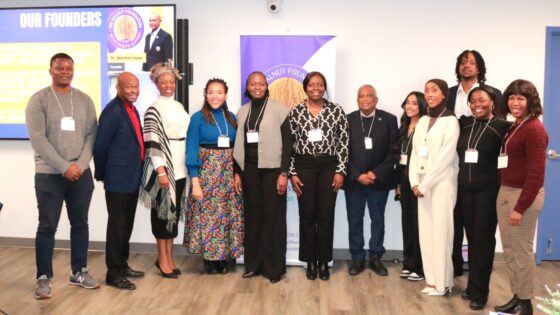on
BY SELINA McCALLUM
During this quarantine, you’re probably watching and listening to a lot of creative content, but how much of that content is Canadian? It is rare to see ourselves as black folks from Toronto reflected in the shows and movies we watch, but one series hopes to change that.
Next Stop is a series which consists of four short episodes posted on the YouTube channel, Bare Minimum.
Three out of the four episodes have just over 1,000 views on YouTube. To secure possible funding to produce more episodes, the team has started campaigning and marketing online to increase their views.
Jabbari Weekes, Tichaona Tapambwa, and Phil Witmer are the creators of the short series.
Weekes and Tapambwa have co-written the episodes, and shared the work directing as well.
Weekes and Tapambwa have a media background and have always been interested in the film industry.
“Jabbari and I have just been looking for a way to get into the television industry. We felt that creating our own content would be the best way to go about it,” said Tapambwa.
Weekes says that he wanted to see more stories specific to black people from Toronto.
“We’ve always kind of wanted black content. We were seeing black content coming out more from America but where are our stories?” Said Weekes. “Of course, there is the amazing content that 4Yall produces. We all know a bunch of Toronto hoodmans skits, but who are these people when they are just being real people.”
The first episode of the series is called Beef which captures the relationship between two friends debating over which subway station in Toronto sells the best beef patties. Vanessa Adams who plays one of the friends says that the best patties comes from Islington station, the West end of the city, while her friend, played by Jordan Hayles, argues that the best patties comes from Warden station, the East end of the city.
In each episode there is also an underlying message that is spoken about as well that mostly people from Toronto would understand. Just before the two friends get into their argument, Jordan Hayles was venting about his struggles finding an affordable place to rent out for himself and his partner.
Both Weekes and Tapambwa invested their own money into creating all four episodes. The cast and crew did a phenomenal job producing a professional and beautifully shot and edited series.
“We thought about how we can tell stories in a realistic way but still be funny and not overly preachy. We blew our savings to try to get that content because we couldn’t find it anywhere else,” said Weekes.
“Nobody will fund us out right, so the best method was to be to produce content that shows that there is a need and a want for this these types of stories, and I guess that’s also why we ended up self-funding,” said Tapambwa.
They asked their friends and family as well for help on the creation of Next Stop. Almost the entire cast and crew knew each other prior to filming. The actors in the film may have not had any experience being on camera before, but they all could connect deeply to the script and to the lingo in different ways.
“We weren’t working with trained actors, but we were working with the right personalities for what we want to shoot,” said Weekes.
The third episode is called Duppy which showcases a “jobless man at the mercy of LinkedIn and seasonal affective disorder when a mysterious spirit appears.” Thousands of people in Canada have been laid off due to the current pandemic, so anyone can relate or knows someone who can relate to this episode.
“I was about to be let go from my previous place of employment and during that time I was just feeling super lonely as I had just come out of a situation with my now ex. Personally I’m okay with being by myself but that was the first time I felt miserable with nothing to do. I guess Caribbean energy, we like to make fun of ourselves when we feel miserable. I had an inside joke with myself calling it duppy recession,” said Weekes.
The narrator of that episode was Sharine Taylor, who also did the graphics for the first episode of Next Stop.
Taylor is also currently writing the second season of Next Stop. She speaks about a lack of shows on television representing the Caribbean-Canadian experience.
“I don’t know if you remember The Kink that used to play on Global TV, it was a screenplay that was developed off the stage play called The Kink in My Hair. I loved that show so much because I felt like it was such a snapshot of Toronto and our Caribbean-Canadian identity and experiences,” said Taylor. “I really think it was a loss that we really didn’t have anything afterwards.”
Next Stop hopes to feature a new character from another part of the city in every episode. Taylor believes that Next Stop really captures what it is like to live in Toronto for most black people.
To learn more about Next Stop and view all four episodes in season one, search for Bare Minimum on YouTube.
Stay in the loop with exclusive news, stories, and insights—delivered straight to your inbox. No fluff, just real content that matters. Sign up today!













